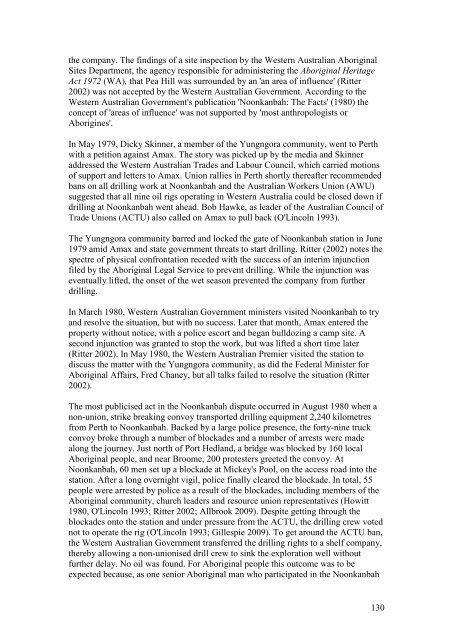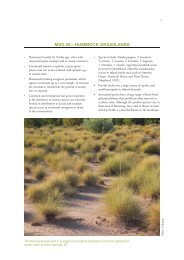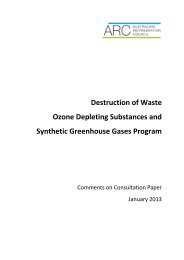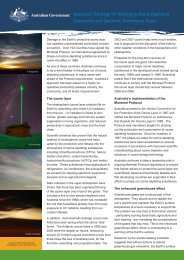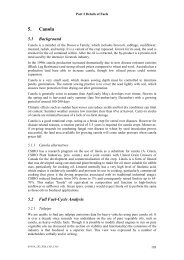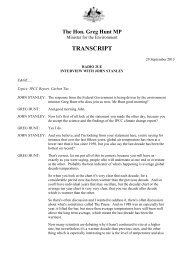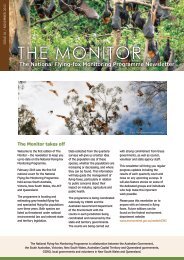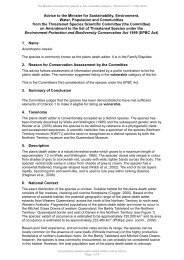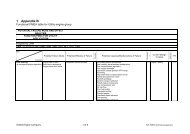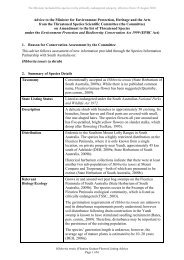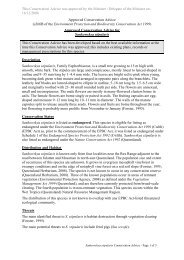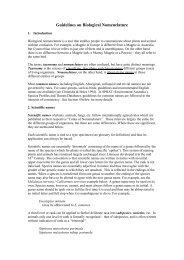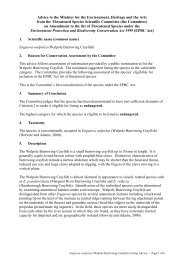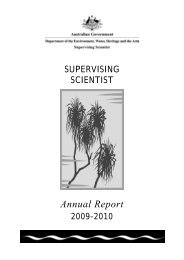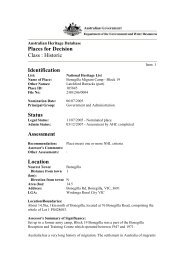WEST KIMBERLEY PLACE REPORT - Department of Sustainability ...
WEST KIMBERLEY PLACE REPORT - Department of Sustainability ...
WEST KIMBERLEY PLACE REPORT - Department of Sustainability ...
You also want an ePaper? Increase the reach of your titles
YUMPU automatically turns print PDFs into web optimized ePapers that Google loves.
the company. The findings <strong>of</strong> a site inspection by the Western Australian Aboriginal<br />
Sites <strong>Department</strong>, the agency responsible for administering the Aboriginal Heritage<br />
Act 1972 (WA), that Pea Hill was surrounded by an 'an area <strong>of</strong> influence' (Ritter<br />
2002) was not accepted by the Western Australian Government. According to the<br />
Western Australian Government's publication 'Noonkanbah: The Facts' (1980) the<br />
concept <strong>of</strong> 'areas <strong>of</strong> influence' was not supported by 'most anthropologists or<br />
Aborigines'.<br />
In May 1979, Dicky Skinner, a member <strong>of</strong> the Yungngora community, went to Perth<br />
with a petition against Amax. The story was picked up by the media and Skinner<br />
addressed the Western Australian Trades and Labour Council, which carried motions<br />
<strong>of</strong> support and letters to Amax. Union rallies in Perth shortly thereafter recommended<br />
bans on all drilling work at Noonkanbah and the Australian Workers Union (AWU)<br />
suggested that all nine oil rigs operating in Western Australia could be closed down if<br />
drilling at Noonkanbah went ahead. Bob Hawke, as leader <strong>of</strong> the Australian Council <strong>of</strong><br />
Trade Unions (ACTU) also called on Amax to pull back (O'Lincoln 1993).<br />
The Yungngora community barred and locked the gate <strong>of</strong> Noonkanbah station in June<br />
1979 amid Amax and state government threats to start drilling. Ritter (2002) notes the<br />
spectre <strong>of</strong> physical confrontation receded with the success <strong>of</strong> an interim injunction<br />
filed by the Aboriginal Legal Service to prevent drilling. While the injunction was<br />
eventually lifted, the onset <strong>of</strong> the wet season prevented the company from further<br />
drilling.<br />
In March 1980, Western Australian Government ministers visited Noonkanbah to try<br />
and resolve the situation, but with no success. Later that month, Amax entered the<br />
property without notice, with a police escort and began bulldozing a camp site. A<br />
second injunction was granted to stop the work, but was lifted a short time later<br />
(Ritter 2002). In May 1980, the Western Australian Premier visited the station to<br />
discuss the matter with the Yungngora community, as did the Federal Minister for<br />
Aboriginal Affairs, Fred Chaney, but all talks failed to resolve the situation (Ritter<br />
2002).<br />
The most publicised act in the Noonkanbah dispute occurred in August 1980 when a<br />
non-union, strike breaking convoy transported drilling equipment 2,240 kilometres<br />
from Perth to Noonkanbah. Backed by a large police presence, the forty-nine truck<br />
convoy broke through a number <strong>of</strong> blockades and a number <strong>of</strong> arrests were made<br />
along the journey. Just north <strong>of</strong> Port Hedland, a bridge was blocked by 160 local<br />
Aboriginal people, and near Broome, 200 protesters greeted the convoy. At<br />
Noonkanbah, 60 men set up a blockade at Mickey's Pool, on the access road into the<br />
station. After a long overnight vigil, police finally cleared the blockade. In total, 55<br />
people were arrested by police as a result <strong>of</strong> the blockades, including members <strong>of</strong> the<br />
Aboriginal community, church leaders and resource union representatives (Howitt<br />
1980, O'Lincoln 1993; Ritter 2002; Allbrook 2009). Despite getting through the<br />
blockades onto the station and under pressure from the ACTU, the drilling crew voted<br />
not to operate the rig (O'Lincoln 1993; Gillespie 2009). To get around the ACTU ban,<br />
the Western Australian Government transferred the drilling rights to a shelf company,<br />
thereby allowing a non-unionised drill crew to sink the exploration well without<br />
further delay. No oil was found. For Aboriginal people this outcome was to be<br />
expected because, as one senior Aboriginal man who participated in the Noonkanbah<br />
130


